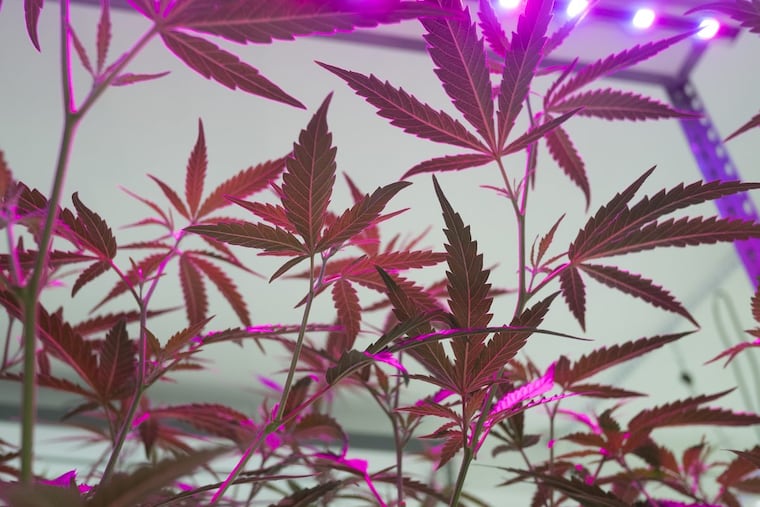Medical marijuana permits leave losers fuming in Pa.
The state last week awarded permits to grow marijuana. Now, the losers are complaining about a lack of transparency and abuse of affirmative action. This could hold up getting medicine to patients.

Pennsylvania's decision last week to award a dozen permits to grow marijuana has ignited a firestorm of controversy, with many losers decrying a lack of transparency and threatening legal action that could delay getting medicine to patients for years.
The permits are thought to be extremely lucrative — about $40 million apiece — so there are bound to be sore losers, industry experts said. In Maryland and Florida, litigation filed by groups that were shut out has stalled those states' programs for years.
"Could this slow down the launch of the program? Well, it's just speculation, but it certainly could," said Charles Pollack, director of the Lambert Center for the Study of Medicinal Cannabis and Hemp, the medical marijuana think tank based at Thomas Jefferson University. "It wouldn't surprise me if some of the people file suit to stop the process until there's more clarity about how the decisions were reached."
In Harrisburg, some lawmakers are getting an earful.
"We're getting inundated with calls from angry applicants," said Steve Hoenstine, spokesman for State Sen. Daylin Leach (D., Montgomery), who spearheaded the state's medical marijuana law along with State Sen. Mike Folmer (R., Lebanon). "The calls are misdirected because we had nothing to do with the scoring process."
It's not surprising that the losers are bitter. The applicants included a who's who of marijuana cultivators with national reputations and locals with deep pockets and lofty aspirations. Only 12 were chosen out of 170 firms.
Applicants also spent up to $750,000 each on application fees, attorneys, consultants, lobbyists, securing real estate, architects, and zoning appeals, said Michael Bronstein, director of the American Trade Association for Cannabis and Hemp.
The Inquirer spoke with a dozen bidders or their representatives who confirmed widespread feelings of ire and anguish.
"Many an influential applicant is volcanically angry in a particularly venomous Philadelphia kind of way," said Steve Schain, of the Hoban Law Group, who represented both successful and losing applicants. "It was an equal-opportunity shellacking, that both the mighty and the not-so-mighty suffered. But the state had to make a decision. There was extraordinarily strong competition."
Few of the disappointed are complaining in public.
"People are afraid of making noise," said Pollack of the Lambert Center. That's because many are applying for the second round of growing permits, which will take the total number of cultivation spaces to 25. In addition, many did not want to jeopardize their chances of winning dispensary permits, which are to be announced Thursday.
Some patients are growing concerned. "I don't want to see lawsuits flying in Pennsylvania," said Cara Salemme, who fought for the state's medical marijuana law so she could give it to her son Jackson, 10, who suffers from intractable epilepsy. "To have it delayed even by a month would be incredibly frustrating. The parents of sick kids, and adult patients, need this medicine."
The Pennsylvania Department of Health, which runs the program, assembled an anonymous panel of state employees to score 170 applications. After the winners were announced, the state released copies of applications that had been heavily redacted by the applicants themselves. Most pages were completely blacked out. Several were so stripped of information that the company owners and backers are not known.
The unsuccessful have a slew of complaints: One of the companies awarded a Pennsylvania license, Vireo Health, is under investigation in Minnesota for illegally shipping $500,000 worth of cannabis oil to an affiliate in New York. (Products are supposed to stay in the state where they are grown.)
A yes/no question about whether firms would practice quality control was scored on a sliding scale for reasons that weren't explained. Of the 12 permits, eight went to out-of-state businesses. Unlike most other jurisdictions where cannabis is legal in some form, the Pennsylvania law came with no residency rule.
The state was the first in the nation to include a diversity requirement, which gave up to 100 points for bolstering minority participation in an industry where African Americans are few.
African American-owned cannabis growers, however, garnered only middling scores on the diversity section. A spokeswoman said the Department of Health would not explain how answers were scored.
The instructions appeared to give firms many ways to show they were diverse, by citing the ethnic minorities, women, and veterans among their staff and financial backers. Instructions also appeared to prefer groups that had been certified as diverse by third-party organizations.
The highest number of diversity points, 93, was awarded to PurePenn LLC, which won a permit to open in McKeesport, near Pittsburgh. One of the few companies not to redact its diversity statement, PurePenn has no African Americans on staff. Two of its six principals and employees, though, were listed as Hispanic or female. It also included an Asian American among its operators and five women as financial backers.
In the middle of the pack, with 60 points, was Pennsylvania Grown Medicine. The company, which was denied a permit to open in predominantly black Chester, Delaware County, is headed by veteran cannabis cultivator Corey Barnette, an African American who is CEO of District Grows in Washington, D.C. Barnette, who sits on the board of directors of Jefferson's Lambert Center, said his group included a racially diverse set of financial backers, among them four African Americans and an Indian American.
"We're miffed." said Barnette, on his business being snubbed for a permit. "There's been a significant drug war that's been waged largely on the backs of ethnic minorities. We thought the diversity provision would address that. But none of the licenses went to communities with ethnic majorities."
PurePenn did not respond immediately to requests for comment.